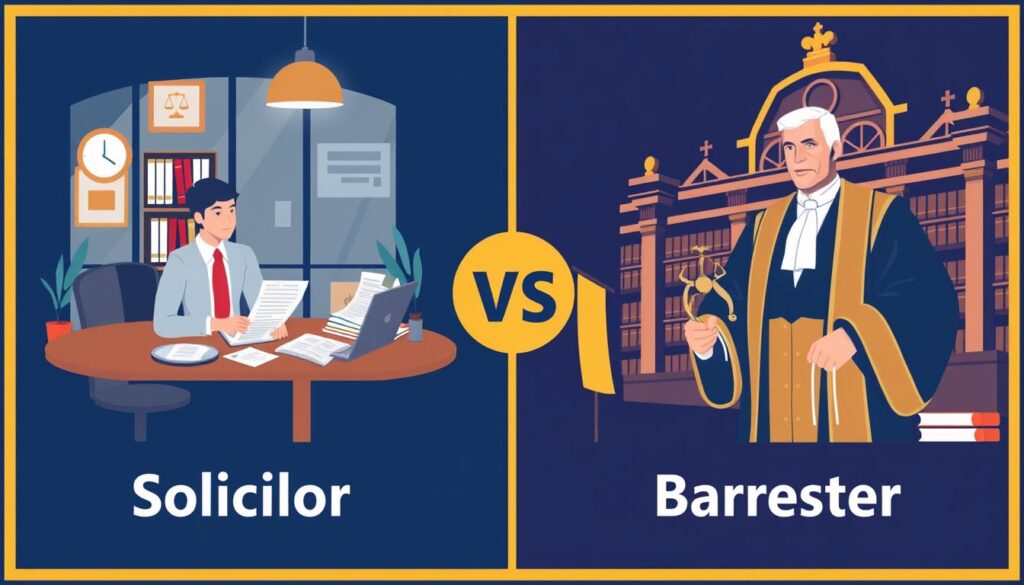Did you know that over 1.7 million legal matters are handled by solicitors in the UK each year? This staggering figure underscores the importance of securing the right legal counsel. Whether you’re entangled in a family dispute, facing criminal charges, or navigating a property transaction, the expertise of legal professionals is indispensable. Access to seasoned legal and lawyer services can significantly influence the outcome of your legal journey.
Key Takeaways
- The UK has a thriving legal services industry, with over 1.7 million legal matters handled annually by solicitors.
- Finding the right legal expert is essential for navigating various legal issues, from family law to criminal defence and property transactions.
- Experienced legal professionals can provide invaluable guidance and support, ensuring the best possible outcomes for their clients.
- The article will explore the range of legal services available, as well as tips for choosing the right lawyer or law firm for your specific needs.
- Readers will learn about the role of solicitors and barristers, understanding legal costs, and accessing legal aid options in the UK.
What Services Do Legal Professionals Offer?
Understanding the array of services offered by solicitors and barristers in the United Kingdom is crucial. These legal professionals are adept in various fields, providing bespoke solutions to a broad spectrum of legal issues.
Family Law
Family law solicitors assist with divorce, child custody, adoption, and financial settlements. They offer legal advice and representation in complex family cases, prioritising the well-being of their clients and any children involved.
Criminal Defence
Individuals facing criminal charges can rely on criminal defence solicitors and barristers to protect their rights. These legal professionals are experts in litigation, case preparation, and courtroom advocacy, crafting effective defence strategies for their clients.
Property Law
Property transactions involve numerous legal complexities. Property law solicitors handle tasks like property conveyancing, title searches, and navigating real estate transactions, ensuring a smooth process for clients.
Personal Injury
Solicitors specialising in personal injury law assist clients in seeking compensation and justice after accidents or injuries. They provide legal advice and representation, guiding clients through the claims process and safeguarding their rights.
How to Choose the Right Lawyer for Your Needs
Securing the right legal counsel is paramount when navigating complex legal landscapes. Whether the issue pertains to family law, criminal defence, property transactions, or personal injury claims, the selection process demands meticulous consideration. It is imperative to evaluate and select a legal professional whose expertise aligns with your specific requirements. The following factors are crucial in determining the suitability of a lawyer for your case:
Assessing Experience and Specialisation
Experience and specialisation are fundamental aspects to evaluate. Law firms with a distinguished track record in your legal domain are more likely to offer the bespoke legal expertise and representation you need. Lawyers who have specialised in your area of concern possess the requisite knowledge and skills to adeptly navigate your case’s complexities.
Understanding Fees and Costs
Legal services exhibit considerable variability in terms of fees and costs. It is essential to comprehend the financial implications before engaging a legal professional. Inquire about their fee structure, whether it’s hourly or fixed, and any additional expenses such as court fees or expert witness costs. Examining client testimonials can offer insights into a lawyer’s value and pricing transparency.
Client Reviews and Recommendations
- Seek out reviews and testimonials from the lawyer’s previous clients to gain a better understanding of their service quality, communication, and overall effectiveness.
- Ask for referrals from friends, colleagues, or other trusted sources who have had positive experiences with a particular lawyer or law firm.
- Check the lawyer’s online presence and professional profiles to see if they have a reputation for delivering successful outcomes for their clients.
By meticulously considering these factors, you can make an informed decision. This ensures that you select the right legal professional to effectively address your specific needs.
The Importance of Legal Consultation
Seeking legal counsel is crucial when navigating the complexities of the legal system. Whether it’s a personal or business-related legal issue, early consultation with a qualified legal professional is invaluable. It provides the preventative legal advice and professional guidance necessary to safeguard your rights and interests.
When to Seek Legal Advice
There are numerous scenarios where seeking legal advice is crucial:
- Drafting or reviewing legal contracts, such as employment agreements, property leases, or business contracts
- Dealing with disputes or legal issues related to family matters, such as divorce, child custody, or inheritance
- Facing criminal charges or navigating the criminal justice system
- Handling personal injury claims or disputes with insurance companies
- Addressing issues related to property ownership, such as zoning, planning permission, or boundary disputes
Benefits of Early Consultation
By seeking legal counsel early on, you can benefit from:
- Proactive planning and risk mitigation, potentially avoiding costly legal disputes down the line
- Gaining a thorough understanding of your legal rights and obligations, empowering you to make informed decisions
- Receiving preventative legal advice to address potential issues before they escalate
- Accessing professional guidance to navigate the complexities of the legal system effectively
Remember, investing in legal counsel at the outset can be a wise decision. It helps safeguard your interests and minimises the risk of future legal complications.
Understanding Legal Costs: What to Expect
The cost of legal services is a pivotal consideration. Grasping what to anticipate facilitates budgeting and decision-making. Legal professionals employ two billing models: fixed fees and hourly rates. Each model presents distinct advantages and considerations.
Fixed Fees vs. Hourly Rates
Some legal experts offer fixed fees for specific services, like drafting a will or handling a simple real estate transaction. This method ensures predictability, aiding in budgeting. Conversely, hourly rates are prevalent for intricate or time-intensive legal issues. The cost for these services is often uncertain at the outset.
Additional Costs to Consider
- Court fees: Depending on your case’s nature, you might incur court filing fees or other administrative expenses.
- Expert witness fees: If your case necessitates an expert witness, such as a medical professional or forensic specialist, their fees will be your responsibility.
- Disbursements: These encompass out-of-pocket expenses for the legal team, including travel, photocopying, or document retrieval.
Grasping the legal fees, cost estimation, and billing practices beforehand aids in effective budgeting. It is crucial to discuss these aspects with your lawyer to avoid unexpected costs in the final bill.
What to Look for in a Law Firm
In the quest to select a law firm, one must delve beyond mere legal acumen and credentials. The standing and magnitude of the firm significantly influence the calibre of service and client contentment.
Specialisation and Expertise
Opt for a law firm with a niche focus on your legal predicament. Such firms boast profound insight and extensive experience, leading to superior advocacy and results for their clientele.
Firm Reputation and Size
Investigate the firm’s standing, encompassing their historical achievements, client testimonials, and accolades from legal bodies. While larger, venerable firms may proffer extensive resources and a cadre of experts, smaller, specialised entities might offer bespoke service and a more individualised strategy.
The ideal law firm for your needs hinges on your specific legal requirements and preferences. By meticulously assessing the legal expertise, firm credentials, and client satisfaction of potential legal counsel, you can identify the most suitable partner for a triumphant resolution of your legal challenge.
The Role of a Solicitor vs. a Barrister

In the UK legal system, solicitors and barristers occupy distinct roles, offering legal representation, courtroom advocacy, and legal advice. Grasping the fundamental differences between these legal professionals is crucial for identifying the appropriate legal support for your specific needs.
Key Differences Explained
The primary distinction between solicitors and barristers resides in their areas of expertise and the services they deliver. Solicitors are primarily responsible for managing the day-to-day legal tasks, including drafting contracts, providing legal counsel, and handling client communications. They serve as the primary contact for most clients seeking legal assistance.
Barristers, conversely, specialise in courtroom advocacy, often representing clients in intricate legal proceedings or high-profile cases. They are typically engaged by solicitors to offer specialist expertise and to argue cases in court.
When to Consult Each
- If you require assistance with routine legal matters, such as drafting a will, buying or selling a property, or handling a divorce, consulting a solicitor is advisable.
- For cases involving criminal charges or complex civil disputes, the expertise of a barrister, who can provide specialised courtroom advocacy and legal representation, is often necessary.
- In many instances, solicitors and barristers collaborate, with the solicitor overseeing the case and the barrister offering expert legal advice and representation in court.
By comprehending the unique roles of solicitors and barristers, you can ensure the most suitable legal representation, courtroom advocacy, and legal advice for your particular legal requirements.
Preparing for Your First Meeting with a Lawyer
Engaging a legal professional for your issue is a pivotal step. To maximise the value of your initial consultation, preparation is key. Gathering pertinent documents and formulating insightful questions will facilitate a seamless and enlightening legal discussion.
Essential Documents to Bring
- Any legal documents pertinent to your case, encompassing contracts, letters, or court documents.
- Relevant financial statements, such as pay slips, bank statements, or tax returns, should be brought if financial aspects are involved.
- Contact details for key individuals, including witnesses or other parties, are crucial.
- A comprehensive timeline of events preceding your legal predicament is advisable.
Questions to Ask Your Lawyer
- Inquire about your lawyer’s experience with cases akin to yours.
- Understand their communication style and the frequency of updates.
- Request an estimate of legal fees and associated costs.
- Seek their strategy for tackling your legal issue and potential outcomes.
- Explore alternatives to litigation, such as mediation or negotiation.
Being adequately prepared with necessary documents and thoughtful questions will enable a productive legal consultation. It will also foster effective client-lawyer communication and initiate the process of case preparation.
Navigating Legal Aid Options in the UK
In the UK, the government’s legal aid system provides public legal assistance. This government-funded legal support ensures access to justice for those financially unable to afford private legal services.
Eligibility Criteria for Legal Aid
To qualify for legal aid, one must meet specific criteria. This includes a financial assessment, considering income, savings, and assets. The legal issue’s nature and its potential impact on the individual’s life are also evaluated.
- Financial eligibility is determined by a means test, examining income and savings.
- The legal issue must fall within the legal aid scheme’s scope, covering family law, criminal defence, and housing matters.
- The applicant must show their case has merit and a reasonable chance of success.
How to Apply for Legal Aid
The application process for legal aid varies by legal issue and individual circumstances. Generally, it involves:
- Consulting a solicitor or legal advisor to assess eligibility and case merits.
- Completing application forms, which may require financial information and supporting documents.
- Submitting the application to the relevant legal aid authority, such as the Legal Aid Agency in England and Wales.
- Waiting for a decision on your application, which determines the legal aid level available.
The availability and scope of legal aid can change due to government policies and budgets. Seeking advice from a qualified legal professional is crucial for navigating the legal aid system effectively.
The Impact of Online Legal Services

In the digital era, legal services have undergone a significant transformation. The advent of digital legal services and online legal advice has revolutionised access to legal expertise. This section explores the advantages and disadvantages of virtual law firms. It also provides guidance on assessing the quality and reliability of online legal assistance.
Pros and Cons of Online Law Firms
Online legal services offer convenience and accessibility, appealing to many individuals and small businesses. Virtual law firms provide a cost-effective and efficient alternative to traditional legal practices. They benefit from lower overhead costs and the ability to serve clients remotely. However, concerns exist regarding the potential lack of personal attention and less comprehensive legal support compared to in-person consultations.
How to Evaluate Online Legal Help
When seeking digital legal services, it is essential to exercise caution and thoroughly evaluate the quality and reliability of the online legal help available. Consider the following factors when assessing online legal providers:
- Credentials and experience of the legal professionals
- Transparency around fees and billing practices
- Client reviews and testimonials
- Clearly defined scope of services and expectations
- Availability of ongoing support and communication
By carefully evaluating these aspects, you can ensure that you’re accessing high-quality online legal advice. This enables you to make informed decisions about your legal needs.
Tips for Effective Communication with Your Lawyer
Building a robust client-lawyer relationship is paramount for the effective resolution of legal disputes. The ability to engage in effective legal correspondence and maintain consistent case management is essential. It ensures your lawyer comprehends your requirements, thereby delivering optimal service.
Establishing Clear Expectations
Initiate your professional relationship by articulating your expectations clearly to your legal counsel. Outline the scope of the work, the projected timeline, and the desired outcomes. This clarity will enable your lawyer to align their efforts with your objectives, ensuring the achievement of your goals.
Maintaining Regular Updates
- Arrange for periodic consultations with your lawyer to review the case’s progress.
- Ensure the prompt transmission of any new information or documents pertinent to your case.
- Clarify any ambiguities regarding the legal proceedings or decisions made.
- Respond expeditiously to your lawyer’s requests for information or documentation, facilitating the case’s efficient management.
Through continuous, open dialogue, you can forge a solid client-lawyer relationship. This fosters effective legal correspondence and streamlines case management, ultimately enhancing the overall legal experience.
Understanding Your Legal Rights in Various Situations
Throughout our lives, we encounter numerous facets, from consumer transactions to employment relationships. These scenarios can be intricate, yet grasping your legal rights is paramount for a favourable outcome. We will delve into two pivotal domains where legal safeguards are indispensable: consumer rights and employment rights.
Consumer Rights
As a consumer, you are enveloped by a spectrum of legal protections designed to safeguard your interests. These legal protections encompass the right to accurate product or service information, the entitlement to refunds or replacements for defective goods, and immunity from deceitful or unfair practices. Acquainting yourself with these civil rights fortifies your ability to navigate consumer scenarios with assurance, thereby ensuring your legal entitlements are respected.
Employment Rights
In the workplace, legal safeguards are in place to protect your rights as an employee. This encompasses the right to equitable and fair treatment, the right to a secure working environment, and immunity from unjust dismissal. Grasping these employment rights and the pertinent legislation equips you to confront workplace adversities and safeguard your interests.
Acquaintance with your legal rights across different scenarios markedly enhances your capacity to manage legal hurdles and attain desirable outcomes. By familiarising yourself with the legal safeguards available to you as a consumer and an employee, you can assert your civil rights confidently and take the necessary steps when required.
How to Handle a Legal Dispute
Dealing with a legal dispute can be overwhelming, yet there are effective strategies to manage it efficiently and economically. It is essential to explore alternative solutions before resorting to court proceedings. This approach can lead to a more satisfactory resolution.
Steps to Take Before Going to Court
Confronting a legal dispute necessitates a careful evaluation of the situation. Start by meticulously examining the case details, collecting all pertinent documents, and ensuring a comprehensive grasp of your legal entitlements and responsibilities. Engaging in direct communication with the opposing party to discuss the issue and seek a common resolution is often a productive initial step.
Mediation and Alternative Dispute Resolution Options
If negotiations fail, consider mediation or other alternative dispute resolution (ADR) methods. Mediation employs a neutral third-party facilitator to aid in communication, negotiation, and finding a mutually acceptable agreement. ADR alternatives, such as arbitration or negotiation, offer a more flexible and cost-effective route compared to traditional court proceedings. They allow the parties to exert more control over the resolution.
